Europe's economic problems to persist into 2011
- Published
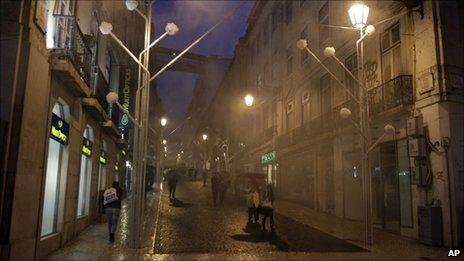
Rainy days are here to stay as a cash-strapped Europe enters 2011
Many millions of Europeans are used to waking up with a hangover after the New Year.
But that is nothing compared with what several of the eurozone governments will feel as the big wheel and the cute winter wonderland cabins are packed away in Place St Catherine, central Brussels.
2010 was hardly an economic picnic, even for countries such as the UK, which chose not to adopt the single European currency eight years ago.
But for the likes of Greece and Ireland, it was the year when the gap between their past spending and the cost of funding became unbridgeable without outside help, leaving them with no choice but to agree bailouts.
For Portugal and Spain it was the year when they came perilously close to being unable to service their national debts.
Deep flaws
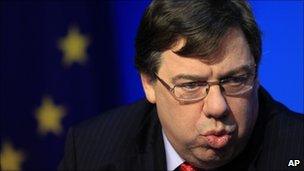
Irish Prime Minister Brian Cowen has made some unpopular and difficult choices
2011 may not bring much relief for these countries, or for others such as Belgium and Italy, which also have huge debt mountains to climb.
Securing the funding of national budgets will remain a number one priority.
From Ireland to Greece, Portugal and beyond, many European workers went on the march and took out their frustrations over the economies and how they have been managed by the parties in power.
Governments have pledged to stop overspending, but deep flaws in the design of the eurozone from the start will be hard to repair in 2011.
Battles of wills
Talking of budgets, at least next year's 126.5bn euro community budget was finally agreed after some eleventh hour horse-trading between the governments and MEPs, or members of the European Parliament.
Almost to the end, Euro-MPs tried to hold out for a 6% rise, but were finally held to a 2.9% increase, with a small concession giving them a say over some contingency funding from 2012.
It was perhaps the greatest test to date of the new "co-decision" system, which gives the European Parliament a bigger shout in decision-making.
We will surely see more of these battles of wills between ministers, the Commission of paid officials that serve them, and MEPs.
Rescue shield
The cash will be used in part to fund the European Union's (EU) new diplomatic service.
Yet pushing through an effective budget freeze without further reforms of the discredited subsidy system, or reducing the UK's annual rebate for that matter, could be storing up trouble for the UK Prime Minister David Cameron.
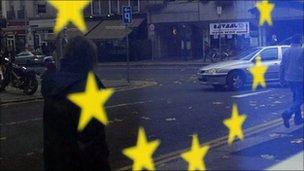
Analysts say a two-speed Europe could emerge in 2011
The deal certainly has not pleased new member states that stand to lose the most EU funds.
The year at least ended with some relief among ministers of all 27 EU nations, agreeing the terms of a post-2014 rescue shield for any of the 16 eurozone governments that have future trouble finding sufficient and affordable borrowing on the world's money markets.
But that deal in itself will bring new headaches in its wake, in the form of potentially even higher interest rates.
That is because, under the new scheme, the lenders involved will be obliged to take a hit themselves if the country borrower defaults.
So, inevitably, they will charge more, effectively a premium to compensate them for taking a "haircut".
'An inconsistency'
More immediately, there remains a big fudge over whether existing bank creditors could still be forced to write down some of their loans under the current rescue arrangements.
Banks in Ireland, Greece and beyond have yet to be restructured with the involvement of EU supervisors.
Carsten Brzeski, a Senior Economist with ING in Belgium who used to work at the European Commission, says the financial markets cannot rest until future debt liabilities are clarified.
"Now we have a situation in which politicians are saying that up to 2013, insolvency is not an issue," he says.
"But after that it could be an issue, because from then on they want private investors participating in any writedowns. This is an inconsistency."
Financial discipline
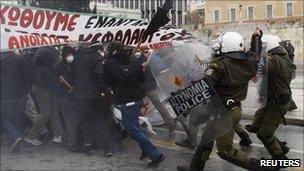
Further clashes between the people and the authorities are expected in 2011
2010 was also the year when Germany's Chancellor Angela Merkel learnt that unguarded statements expressing frustration or future intentions can easily bring down another country -- or at least hasten the day of reckoning, in the case of Ireland.
The fault lines between the EUs biggest bank roller and the rest were crystal clear when Luxembourg's prime minister Jean-Claude Juncker accused Mrs Merkel, the chancellor, and her government of being "un-European".
The accusation clearly hit home, and Germany notably softened its line in Brussels, affirming its commitment to the euro.
One test of this could be whether the country rethinks its opposition to bonds jointly issued by all 16 euro countries.
It has objected because it believes having to pay high interest rates is the best way to force a country to cut its spending.
European Central Bank support
With the debt markets reacting to every nuance of what European policymakers say, it is no wonder central bank chiefs such as the European Central Bank's (ECB) Jean-Claude Trichet always choose their words very carefully, speaking in that special code beloved of central bankers.
Yet it became clear towards the end of 2010 that the ECB is already rescuing a whole string of eurozone countries and their banks on a daily basis, providing unlimited funds to boost their standing and buy up unattractive national bonds.
Mr Trichet has repeatedly made clear that he is uncomfortable with the scale of these operations and he has said such funding cannot continue unchecked.
2011 may be the year when we hear far more about the nature of support being provided by the ECB, and what it is costing.
Peripheral problems
So, away from the troubled margins of the Eurozone, is there financial life at the core of Europe?
The emphatic answer to that is yes, with Germany seeing almost twice the average growth, as it is way ahead of the pack in the battle for export orders.
Specialists at the economic survey house Markit say data from purchasing managers and others involved in industry and services all point to a two-speed Europe in 2011.
"The main core is Germany, which is growing extremely well and even taking on more staff," says Chris Willamson, chief economist, Markit.
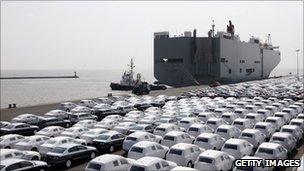
Export-led growth, spurred on by devalued currencies, was not an option for eurozone members
"Its expansion is feeding through to other countries like Poland and the Czech republic, which are exporting goods back to Germany.
"The problem is lower down south in the periphery in Spain, Italy, Portugal, Greece and Ireland."
Markit points out that these countries have big debts to repay, but demand from consumers for goods and services is weak.
"These countries cannot grow at the same speed as Germany because people don't have much money to spend," explains Mr Williamson.
Financial hangover
Summing up the events of 2010, you could say it was the year when recent convergence between poorer and richer, between heavily borrowed and prudent, was reversed in a flash by unforgiving markets.
Fabian Zuleeg, chief economist of the Brussels European Policy Centre, an independent think tank in Brussels, says that fixing the public finances of the likes of Ireland, Greece, Portugal and Spain in 2011 will not be enough.
Without intervention, the economies of Europe will continue to diverge and threaten the destruction of the euro and the ECB, he insists.
"The first step is to come up with a programme of economic reform that doesn't just cut public deficits," Mr Zuleeg says.
"The stronger European partners have to find ways to invest in their economic competitors, perhaps by issuing EU bonds tied to specific projects in fields such as transport and energy.
"Means need to be found to improve the quality of the spending on public services and pension systems, and cutting red tape in many of these countries," Mr Zuleeg says.
Much of Europe's faltering recovery so far has been artificial, buoyed by quantitative easing and financial aid from the ECB.
The best hope perhaps is that the economic tide may turn in 2011, just enough to offset some of the financial hangover from 2010.